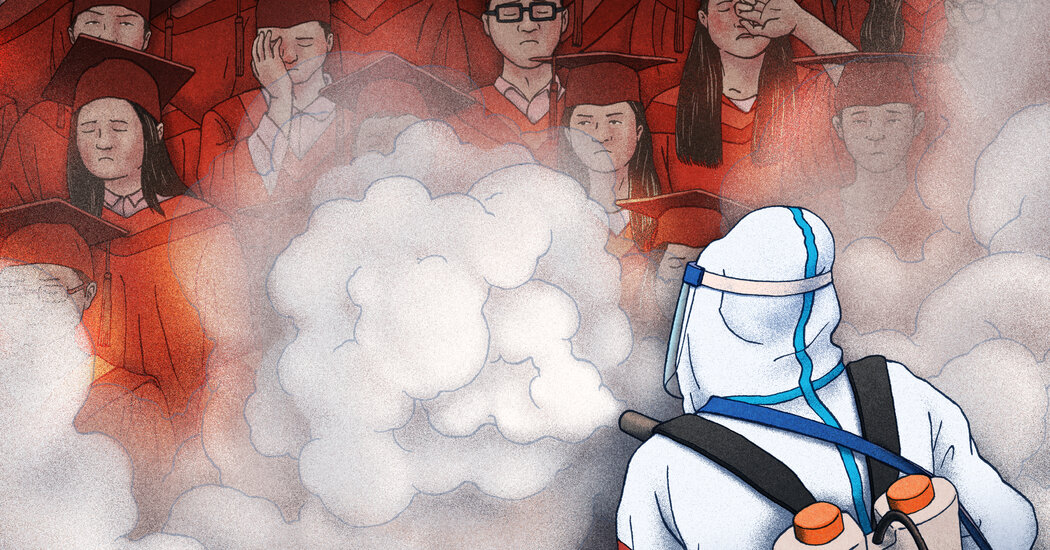
Four years ago, many young Chinese liked to use the hashtag #Amazing China.
Two years ago, they said that China was the “A” student in pandemic control and urged the rest of the world, especially the United States, to “copy China’s homework.”
Now many believe that they’re the most unlucky generation since the 1980s as Beijing’s persistent pursuit of the zero Covid policy is wreaking havoc. Jobs are hard to find. Frequent Covid testing dictates their lives. The government is imposing more and more restrictions on their individual liberty while pushing them to get married and have more children.
“I can’t stand the thought that I will have to die in this place,” said Cheng Xinyu, a 19-year-old writer in the southwestern Chinese city of Chengdu, who is thinking of migrating to foreign countries before the government’s iron fist falls on her.
She can’t imagine having children in China, either.
“I like children, but I don’t dare to have them here because I won’t be able to protect them,” she said, citing concerns like pandemic control workers breaking into apartments to spray disinfectant, killing pets and requiring residents to leave the keys in their apartment door locks.
Ms. Cheng is part of a new trend known as the “run philosophy,” or “runxue,” that preaches running away from China to seek a safer and brighter future. She and millions of others also reposted a video in which a young man pushed back against police officers who warned that his family would be punished for three generations if he refused to go to a quarantine camp. “This will be our last generation,” he told the police.
His response became an online meme that was later censored. Many young people identified with the sentiment, saying they would be reluctant to have children under the increasingly authoritarian government.
“Not bringing children to this country, to this land, will be the most charitable deed I could manage,” wrote a Weibo user under the hashtag #thelastgeneration before it was censored. “As ordinary people who’re not entitled to individual dignity, our reproductive organs will be our last resort,” wrote another Weibo user.
The “run philosophy” and the “last generation” are the rallying cries for many Chinese in their 20s and 30s who despair about their country and their future. They are entering the labor force, getting married and deciding whether to have children in one of the country’s bleakest moments in decades. Censored and politically suppressed, some are considering voting with their feet while others want to protest by not having children.
This is quite a departure for members of a generation previously known for its nationalistic penchant.
They grew up as China rose to become the world’s second-biggest economy. They trolled critics of Beijing’s human rights records and boycotted many Western brands for perceived slights of their motherland.
Sometimes they complained about their grueling work schedules and lack of upward social mobility. But if they were less sure of their personal future, they were confident that China would be great again — as their top leader promised.
This spring it has become increasingly clear that the government can’t live up to its promises and that the state has different expectations for their lives.
A new survey of more than 20,000 people, mostly female between 18 and 31, found that two-thirds of them didn’t want to have children. The government has a different agenda, pushing people to have three children to rejuvenate one of the fastest-aging populations in the world.
Doris Wang, a young professional in Shanghai, said she had never planned to have children in China. Living through the harsh lockdown in the past two months reaffirmed her decision. Children should be playing in nature and with one another, she said, but they’re locked up in apartments, going through rounds of Covid testing, getting yelled at by pandemic control workers and listening to stern announcements from loudspeakers on the street.
“Even adults feel very depressed, desperate and unhealthy, not to mention children,” she said. “They’ll definitely have psychological issues to deal with when they grow up.” She said she planned to migrate to a Western country so she could have a normal life and dignity.
Compounding the frustrations, headlines are full of bad news about jobs. There will be more than 10 million college graduates in China this year, a record. But many businesses are laying off workers or freezing head counts as they try to survive the lockdowns and regulatory crackdowns.
Zhaopin.com, a recruiting site, found that its job prospect index in the first quarter of this year was about half what it was a year earlier and even lower than when the coronavirus first struck in 2020. Graduates who have signed offers will be paid 12 percent less per month on average than last year, the company reported.
A growing number of college graduates are trying to get into graduate schools or pass the increasingly competitive public servant examinations to land a secure government job.
Two-thirds of 131 new recruits of civil servants in Beijing’s Chaoyang district in April had a master’s or doctoral degree, according to a government document, reflecting an increasing trend. They graduated from top universities in China and around the world, including Peking University, University of Hong Kong, University of Sydney and Imperial College London. Many of them will be doing the most basic government jobs, ones that high school graduates used to fill.
The Latest on China: Key Things to Know
Discontent among the population. The Chinese government’s censorship and surveillance, which the pandemic has aggravated, are pushing a small but growing group of Chinese to look for an exit. Younger Chinese in particular are embracing the view that they might need to flee the country in the pursuit of a safer and brighter future abroad.
A Ph.D. graduate of particle physics from Peking University will become an urban management officer, or chengguan, according to the report. Chengguan are the most reviled officials, known for brutalizing beggars, chasing down street vendors and assisting in tearing down people’s homes. The contrast is too rich.
One bright spot in the job market is in Covid testing. As Beijing sticks to the zero Covid policy, local governments need a lot of people to staff their numerous testing stations. Henan Province in central China said in January that it would train 50,000 people this year in Covid testing, disinfecting and public sanitation management. But even a government-run news site asked what kind of career prospects these jobs offered after the pandemic.
For the young Chinese, the increasingly stringent social controls are equally depressing.
Some students in Changchun in northeastern Jilin Province complained on social media that they couldn’t shower for more than 40 days when the city was locked down and had no access to public bathhouses.
Tongji University in Shanghai, known for its engineering and architecture programs, issued detailed instructions on how to use a mobile phone-based queuing system for the toilets and washrooms, according to a document on the system reviewed by The New York Times.
Students would need to press “start” when they left the dorm for the toilet and press “stop” when they returned to avoid having two people in the hallway at the same time, the instructions said. Each toilet run would be allowed a maximum 10 minutes. After eight minutes, the others in the queue could digitally poke the student in the toilet. After 10 minutes, the student would need to explain to the queuing group why it took so long.
Some of the social control mechanisms were never lifted.
In 2020, the prestigious Fudan University in Shanghai developed a tracking system that requires its students to register their health conditions and real-time locations every day. It’s similar to systems that some countries, including South Korea, developed to monitor travelers for short-term home and hotel quarantines. Fudan students have had to register in the system daily, doing so even during the year and half when there were very few infections in China. If they fail to do so, they’re not allowed onto the campus, according to a step-by-step registering process reviewed by The Times.
Universities have very little tolerance for any act of disobedience.
Sun Jian, a graduate student at Ludong University in eastern Shandong Province, was expelled in late March after he walked around the campus holding a sign saying, “Unlock Ludong.” He was also admonished by the police for disturbing the public order.
A college student in Shanghai told me that her adviser had been able to track her down for a critical Weibo comment she made about the lockdowns — even though she had used a pseudonym. She was told to delete the post.
It’s impossible to measure how many young Chinese have become disillusioned by the government’s iron fist in the latest lockdowns, which have affected hundreds of millions of people. Beijing has complete control over the propaganda outlets, the internet, the text books, the schools and nearly every aspect that could touch the brain waves of the Chinese public.
But the growing online disenchantment is unmistakable. And people will always find ways to escape suppression. In “1984,” Winston wrote a diary. In “The Unbearable Lightness of Being,” Tomáš and Tereza moved to the countryside.
“When you find that as an individual you have zero ability to fight back the state apparatus, your only way out is to run,” said Ms. Wang, the young professional in Shanghai.




